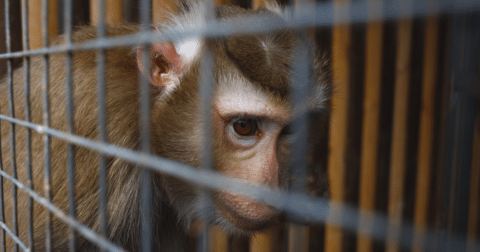News
GLP-1 Users Lose Weight, and Their Taste for Meat
Research•3 min read
Feature
Some very well known colleges are some of the worst animal rights offenders.


Words by Sophie Kevany
A million-dollar funding demand for university research centers identified for their poor animal welfare standards will do little to help the primates they experiment on, an analysis by a U.S. animal advocacy group finds. The 2024 fiscal year funding request made by the National Institutes of Health would grant America’s seven primate research centers, six of which are based in universities, an extra $30 million to “expand, remodel, renovate, or alter existing research facilities or construct” new facilities and infrastructure.
Yet most of the research centers’ animal welfare breaches are, however, linked to “staff carelessness or inadequate training and supervision.” In other words, these are not problems that might be solved by renovations or expansions, says the Animal Welfare Institute, which based its analysis on US Department of Agriculture inspector reports.
The USDA’s Animal and Plant Health Inspection Service is charged with checking on research animals and delivering citations or fines for breaches of the Animal Welfare Act.
The universities housing America’s National Primate Research Centers, which have all breached the welfare act over the last decade, are Emory, Oregon Health & Science, Tulane, the University of California, Davis, the University of Washington and the University of Wisconsin-Madison. The seventh primate research center, which also breached welfare laws, is in the Texas Biomedical Research Institute.
Instead of building improvements, the $30 million would be better spent on “further development of modern research technologies that do not rely on animals,” Joanna Makowska, PhD, a director and senior animal behavior scientist at the Animal Welfare Institute, tells Sentient. And the funding should be conditional on raising animal welfare standards at the centers, she adds.
Four of the universities have incurred USDA fines, with some of the highest penalties given to Oregon Health and Science University, where 15 primates have died since 2014, and inspectors found 10 critical welfare law breaches, the Institute’s analysis shows.
A critical breach of the law is defined by the USDA as one that has “a serious or severe adverse effect on the health and well-being of the animal.” If an issue is non-critical, the USDA says, “the inspector should determine if it should be cited on the Inspection Report,” or not.
Problems at Oregon Health and Science University included the failure to remove two monkeys from their cage before the cage was placed in an automatic washer. Both died.
The most fined university is Wisconsin-Madison. Two primates have died there since 2014 and there were eight critical breaches of welfare law, the analysis found. In one incident, the USDA said the university “failed to provide potable water to all NHPs [non-human primates] … [and that the] drinking water supply for three NHPs was disconnected for no less than four days causing dehydration” for all three animals. One had to be killed. Another monkey died after it was attacked by an aggressive cagemate just days after a similar attack.
Asked for comment, the Texas Biomedical Research Institute said it had nothing to add, and only one of the universities named in the Institute’s analysis responded to Sentient’s request for comment.
In an email, a Wisconsin-Madison spokesperson said it is “committed to ethical animal research” and conducting “safe and responsible studies that improve human and animal health.”
In another email, the NIH told Sentient it “takes animal welfare concerns very seriously and is committed to protecting the well-being and health of all laboratory animals,” and that the requested $30 million would be spent on a range of construction updates including new “animal holding rooms … centrifuges, ultrasound devices, clinical analyzers, and veterinary clinical support areas [as well as] clinical/veterinary care, and psychological and environmental enrichment, which necessitates highly skilled technical staff and additional resources.”
Popular university ranking systems like U.S. News & World Report do not mention animal welfare, which means many prospective college students are unlikely to know of the research centers holding their primate cousins — much less consider how well or badly they are treated.
Creating a welfare ranking using USDA data would be possible, Makowska says, but there are several caveats. One problem, she says, is that “the number of [USDA] citations is not a one-to-one reflection of an institution’s true animal welfare record.”
Another problem, she says, is the USDA has no “clear definition for what constitutes a critical citation.” That means there “are cases where the same situation is cited as critical during one inspection, and non-critical in another inspection.”
Thirdly, most lab animals are not covered by welfare laws in the first place. “The vast majority of animals used in research are mice, rats and fish. Many birds too,” all of which are excluded from the Animal Welfare Act, and therefore, not subject to USDA inspections, says Makowska.
That means the university or facility’s welfare record “only reflects how they treat” animals covered by the law such as primates, dogs and cats.
Asked if USDA fines might be another possible metric for a college ranking, Makowska again said yes, with caveats. These include the fact that “non-compliances [with the Animal Welfare Act] do not automatically trigger fines,” although it would be a guide to the most grievous cases because “we believe that fines are likely levied against the most serious offenses.”
Examples of incidents that have not merited fines, the Animal Welfare Institute found, include “monkeys dying because they were deprived of water or adequate veterinary care,” monkeys left overnight “outside their enclosure,” and monkeys “strangled by chains holding improperly installed enrichment devices.”
The other complication is “no information about how the USDA calculates fines,” Makowska says.
Instead of a USDA-based ranking that risks offering only a patchy profile of a university’s animal welfare record, Makowska suggests applicants look for colleges that have a post-research adoption policy for animals, use non-animal alternatives for teaching and “at the very least, have an opt-out policy for students who do not wish to participate in the use of animals in their education.”
Using the search box provided, applicants could additionally check colleges by putting their names into the USDA’s official warnings and alleged violations database. Over the last few years, university names shown in that database include Brown, Baylor, Boston, Brandeis, California-Berkeley, Dartmouth, Oklahoma State, Rutgers, Stanford, Texas A&M and Vanderbilt.
This piece has been updated. An earlier version stated that OHSU was the most fined university and University of Wisconsin-Madison the second-most fined when it is the opposite.